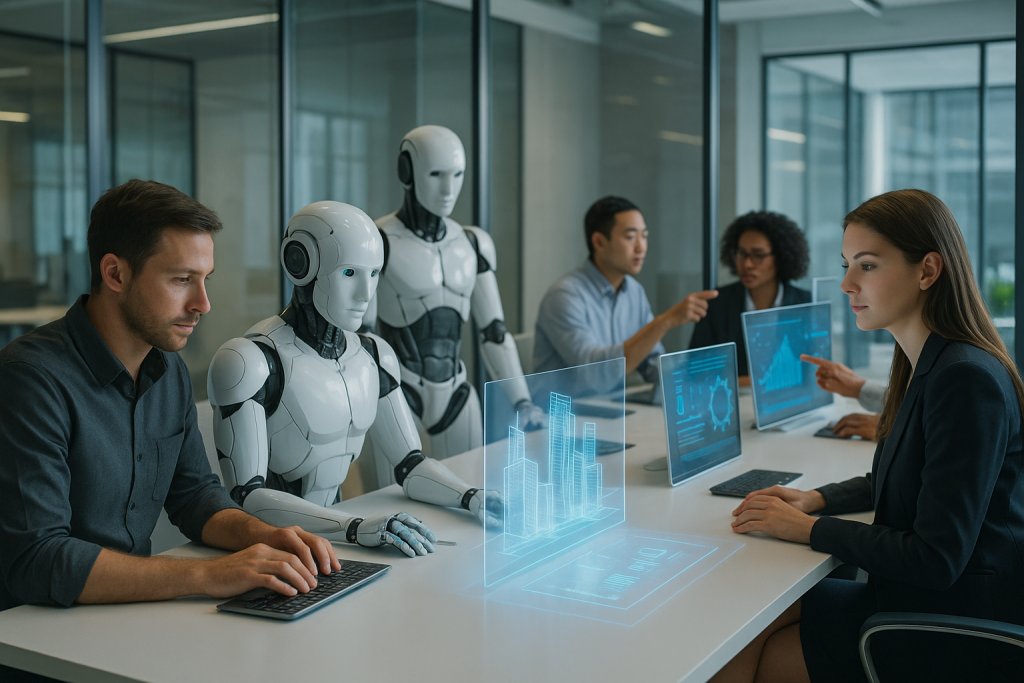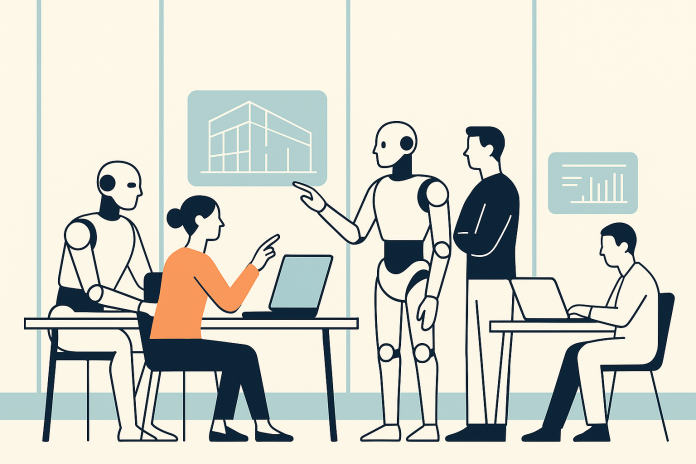The workplace of tomorrow will not be defined by humans versus AI, but by humans and AI working together to solve problems in ways that neither could accomplish alone.
The rapid advancement of artificial intelligence technology is fundamentally transforming the nature of work across virtually every industry. This transformation brings both challenges and exciting opportunities for working professionals who want to remain competitive in an increasingly AI-integrated economy. Let’s explore how AI is reshaping the job landscape, what new careers are emerging, and most importantly, how you can prepare for success in this evolving environment.
How AI Is Transforming Today’s Jobs
AI technology isn’t simply replacing jobs—it’s redefining them. What we’re witnessing is less about wholesale elimination of positions and more about the evolution of roles and responsibilities. AI excels at automating routine, repetitive tasks that follow predictable patterns, which means the nature of human work is shifting toward areas where we provide unique value:
Tasks involving complex decision-making, creative problem-solving, emotional intelligence, and ethical judgment are becoming the central focus of human work. These are precisely the areas where AI systems struggle most. For example, while an AI might efficiently analyze thousands of medical images for potential abnormalities, it’s the human doctor who integrates this information with the patient’s complete medical history, personal circumstances, and preferences to make appropriate treatment recommendations.
This shift represents a fundamental change in how we define productivity and value in the workplace. The most successful professionals will be those who can work alongside AI systems, leveraging their capabilities while applying distinctly human skills to solve complex problems.

Emerging Careers in the AI Economy
The AI revolution isn’t just changing existing jobs—it’s creating entirely new career paths that didn’t exist just a few years ago:
AI Ethics Specialists are becoming essential as organizations recognize the need for responsible AI development. These professionals help establish guidelines for fair and ethical use of AI technologies, considering potential biases, privacy concerns, and social impacts.
Human-AI Collaboration Managers oversee teams where humans and AI systems work together. They understand both human psychology and AI capabilities, optimizing workflows to leverage the strengths of each.
AI Trainers and Data Quality Specialists ensure that AI systems receive properly labeled, diverse, and representative data. They help mitigate algorithmic bias and improve model performance.
Explainable AI Developers build systems that can clearly communicate how they reach decisions. This transparency is crucial for applications in healthcare, finance, legal settings, and other sectors where understanding decision rationale is essential.
AI Implementation Consultants help businesses identify processes that could benefit from AI integration and develop strategies for successful adoption.
Prompt Engineers design and refine instructions for large language models and other generative AI systems to produce desired outputs. This emerging field requires understanding both the technical capabilities of AI and the nuances of human language.
Synthetic Data Designers create artificial datasets that mimic real-world information. These datasets help train AI systems without compromising privacy or when real data is scarce.
Human-in-the-Loop Specialists oversee AI systems that require occasional human judgment, ensuring proper functioning while continuously improving system performance.
Preparing for the AI Workplace Transformation
The AI revolution demands a thoughtful approach to career development. Here are key strategies to help you not just survive but thrive in this changing landscape:
-
Cultivate AI Literacy
You don’t need to become a data scientist or AI engineer, but understanding AI fundamentals is becoming as important as basic computer literacy was in previous decades. Familiarize yourself with:
- The capabilities and limitations of different AI technologies
- How AI systems learn and make predictions
- Appropriate use cases for AI tools in your field
- How to effectively prompt and interact with AI systems
This knowledge will help you identify opportunities where AI can enhance your work rather than replace it.
-
Develop Complementary Skills
Focus on developing capabilities that complement rather than compete with AI:
Complex Problem Solving: AI excels at pattern recognition but struggles with novel situations requiring creative approaches. Developing your ability to tackle unique, ill-defined problems will make you invaluable.
Emotional Intelligence: Understanding human emotions, building relationships, and navigating social dynamics remain distinctly human capabilities. These skills are essential in roles involving leadership, negotiation, counseling, teaching, and customer relations.
Ethical Judgment: Making nuanced ethical decisions requires understanding complex human values and societal norms. This capacity for moral reasoning gives humans a crucial advantage in scenarios with competing priorities or unclear ethical guidelines.
Critical Thinking: The ability to evaluate information, detect flawed reasoning, and make sound judgments is increasingly valuable as AI systems generate vast amounts of content that may be convincing but incorrect.
Interdisciplinary Thinking: Some of the most valuable insights come from connecting ideas across different domains. Humans excel at this form of lateral thinking, drawing from diverse life experiences to create novel solutions.
-
Embrace Continuous Learning
The accelerating pace of technological change means that lifelong learning is no longer optional—it’s essential:
- Set aside regular time for learning new skills and staying current with industry developments
- Take advantage of online courses, webinars, and certification programs
- Participate in communities of practice where professionals share knowledge
- Experiment with new AI tools to understand their capabilities firsthand
- Seek mentorship from those successfully navigating AI integration
-
Adopt a Collaborative Mindset
Rather than viewing AI as competition, approach it as a powerful collaborator:
- Identify aspects of your work that could benefit from AI assistance
- Experiment with ways to incorporate AI tools into your workflow
- Focus on how AI can help you deliver greater value in less time
- Be willing to reimagine established processes and practices
-
Develop Technical Flexibility
While not everyone needs deep technical expertise, a certain level of technical adaptability is becoming essential:
- Learn basic data analysis skills to interpret AI outputs
- Understand how to effectively prompt AI systems for optimal results
- Develop enough technical knowledge to communicate clearly with AI specialists
- Stay informed about emerging technologies relevant to your field
Essential Skills for the AI Era
As AI continues to reshape the workplace, certain skills are becoming increasingly valuable across most professional contexts:
- Human-AI Collaboration: The ability to work effectively alongside AI systems, understanding when to rely on AI capabilities and when human judgment is needed.
- Digital Content Creation: Using AI tools to produce compelling written, visual, and multimedia content while maintaining a distinctive human voice and perspective.
- Data Interpretation: Making sense of complex data and AI analyses, recognizing patterns, identifying anomalies, and extracting meaningful insights.
- Learning Agility: Quickly adapting to new technologies and work processes, continuously updating skills as requirements evolve.
- Communication Excellence: Clearly articulating complex ideas, active listening, persuasion, and facilitating meaningful human connections—all areas where AI still falls short.
- Ethical Reasoning: Identifying potential ethical concerns in AI applications and ensuring responsible use of technology.
- Creative Intelligence: Generating novel ideas, approaches, and solutions that go beyond what AI can currently produce.
- Systems Thinking: Understanding complex interactions between technology, humans, organizations, and society.
Conclusion: Embracing the AI Future
The AI revolution represents one of the most significant transformations in the history of work. While this change brings uncertainty, it also creates unprecedented opportunities for those who approach it strategically.
By developing a blend of technical literacy and distinctly human capabilities, you can position yourself not just to survive this transition but to thrive in it. The most successful professionals will be those who view AI not as a threat but as a powerful tool that, when properly harnessed, enables them to achieve more than ever before.
The workplace of tomorrow will not be defined by humans versus machines, but by humans and machines working together to solve problems in ways that neither could accomplish alone. By embracing this collaborative future and developing the skills to navigate it effectively, you can ensure your continued relevance and success in an AI-transformed economy.

Ready to Embrace Continuous Learning? Chat with our AI chatbot for guidance!
AI Tools:
Image Generation: ChatGPT
Copywriting: claude
Video idea, script & storyboard: Filmora
Video/Audio Generation: Filmora, hailuoai
Infographic: napkin
AI e-learning Consultant: Chatbase


